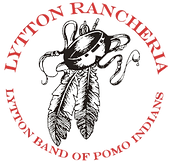Lytton Tribe
LYTTON RANCHERIA

A HISTORY OF STRENGTH, SURVIVAL, AND PROSPERITY
ORIGINS
The Lytton Rancheria of California is a federally recognized tribe whose ancestral lands span the northern San Francisco Bay Area to the Russian River Valley. For thousands of years, the Pomo people lived in balance with the land, sustained by rich natural resources and extensive trade networks.
European colonization and the California Gold Rush brought devastating consequences. By the late 1800s, state-sponsored violence, displacement, and disease had reduced California’s Native population from an estimated 350,000 to about 15,000. Many Pomo families were left landless and impoverished.
In the early twentieth century, the federal government sought to correct this injustice by purchasing small parcels of land known as rancherias for displaced California tribes. The Lytton Rancheria was established in Sonoma County through this program, providing the Tribe with a modest homeland.

TERMINATION AND LOSS
The Tribe’s stability was short-lived. Under the California Rancheria Termination Act of 1958, the federal government dissolved dozens of tribal governments and sold their lands, including the Lytton Rancheria in 1961. This policy, was part of a national effort to force assimilation, and once again left the Lytton people without land or federal recognition.
Despite this, the Tribe remained united, preserving its identity, governance, and community ties through decades of adversity.
RESTORATION AND RENEWAL
After years of advocacy, Lytton, under the leadership of Chairperson Margie Mejia, joined other tribes in challenging the legality of their termination. In 1991, a federal court ruled in Scotts Valley Band of Pomo Indians of the Sugar Bowl Rancheria v. United States that the termination of the Lytton Rancheria was unlawful. Federal recognition was formally restored, reaffirming the Tribe’s sovereign status and rights under United States law.
BUILDING ECONOMIC INDEPENDENCE

In 2000, Congress approved for land in San Pablo, California, to be taken into trust for the Lytton Rancheria. The Tribe opened a Class II gaming facility on this site which had previously been a card club. Today, the San Pablo Lytton Casino’s success generates revenue that supports tribal education, healthcare, housing, and economic diversification for Lytton and the surrounding communities.
Beyond gaming, the Tribe has built a diverse portfolio of enterprises that include property management, viticulture, lending, and healthcare. Its vineyard operations in Sonoma County follow sustainable and fish friendly practices that restore watersheds and promote environmental stewardship. In 2024, the Tribe unveiled plans for its new Tribal Homeland, a 146-home Master-Planned Community near Windsor, Lytton’s first tribal housing development since 1961. The community provides long-term homes for tribal members while strengthening cultural connections and fostering a vibrant, supportive environment for future generations.
COMMITMENT TO COMMUNITY
The Lytton Rancheria has long been recognized as a responsible and generous community partner. In San Pablo, the Tribe provides significant support for city services and local nonprofits, including funding for youth programs, addiction recovery, and healthcare.
Since returning to Sonoma County, the Tribe has focused on being a good neighbor, supporting schools, fire services, and children’s programs throughout the region. The Lytton Education Center and First Step preschool program serve tribal and local families alike, while donations to organizations such as the Windsor Fire Protection District, Luther Burbank Center for the Arts, and Sonoma County Children’s Charities continue to strengthen community well-being.
Most recently, the Tribe reinforced its commitment to education in Windsor through two key contributions: supporting Read On, Sonoma! to promote literacy and early learning, and serving as a major contributor to the completion of the new Margie Mejia Preschool at Mattie Washburn Elementary School, named in honor of the Tribe’s late Chairperson.

The Tribe also directs Indian Health Service funding to the Sonoma County Indian Health Project, ensuring all Native people in the region have access to quality healthcare.
LOOKING FORWARD
Today, the Lytton Rancheria of California stands as a testament to endurance and renewal. From the near erasure to restored sovereignty and self-reliance, the Tribe continues to honor its ancestors through responsible governance, cultural revitalization, and a steadfast commitment to its people and neighbors.